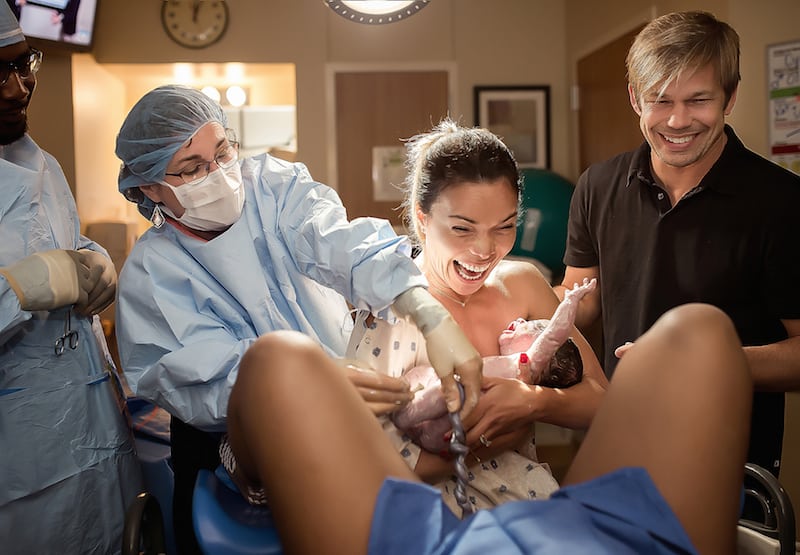
All Your Questions About Surrogacy Answered
Written by Erin Feher
Photography by
Photographed by Leilani Rogers
Kim Bergman is a licensed psychologist of 30-plus years, and a mom of two daughters, ages 23 and 20. When Kim and her wife were looking to make a baby more than two decades ago, the medical advice she received from a doctor was “just have a one night stand.” Third-party-assisted reproduction—as in sperm and egg donation, and surrogacy—was in its infancy, and they were basically left to figure it all out on their own. She and her wife, now married 36 years, ended up using a sperm donor to conceive, and Kim later decided to make a career out of ensuring a smoother, less mysterious process for others, especially aspiring parents in the LGBTQ+ community. Today she’s a senior partner at Growing Generations, a full-service egg donation and surrogacy agency, and the author of the new book Your Future Family—a step-by-step guide to third party–assisted reproduction that details the many paths to parenthood through stories from real families that she’s worked with. According to Kim, more than 20,000 families have been helped by third party–assisted reproduction over the past four decades. Below, she answers some of the most common questions asked about surrogacy, and egg and sperm donation.
What has your personal experience been with assisted reproduction? “My wife and I have 2 daughters that we had with the help of a sperm donor. We used an anonymous but open identity donor so that our kids could reach out to the donor after they turn 18 if they wanted to. So far neither of them has wanted to!”
How have you seen assisted reproduction change since you had your kids? “Back when I had my kids there was no social media, no place to turn for answers or support. My wife and I were pioneers and were basically cobbling things together on our own. We had trouble finding a doctor who would help us—we were actually given the advice to ‘just have a one night stand.’ So, we figured it out for ourselves. In general, what I’ve seen in the past two decades is a trend toward people being more and more accepting of third-party as a method to fulfill their dreams of parenthood. For gay men and lesbians I see a trend towards people starting their family building much earlier than in years past. More and more LGBTQ intended parents are wanting to follow a more ‘traditional’ trajectory for themselves, finding their partners, getting married and wanting to become parents. In the past, gay men especially tended to come back to fatherhood after coming out. They had been tamping down their wish to be daddies and then come back to it a bit later in life, when their wish for fatherhood persisted.”
Who should consider surrogacy? Who should not? “Anyone who needs extra help having a baby should consider surrogacy. Intended parents who can create embryos but not carry a pregnancy, or who can not create embryos but can carry a pregnancy or anyone who needs help with both creating embryos and carrying a pregnancy will benefit from third-party assisted reproduction. The process requires a level of trust and collaboration which can be challenging for some people. It’s still doable—but just more challenging for people for whom trust is hard. Surrogacy is a collaboration, a coming together of a whole group of people with one aim in mind: helping you become a parent. So, it helps if you are also a team player.”
What are the psychological challenges associated with surrogacy? “With assisted reproduction there can be a series of losses—including the loss of carrying or the loss of a genetic link. Like any loss, there is a natural grieving process as intended parents move from plan A (carrying their own genetic child) to plan B or C or D—having someone else carry their baby, or having someone else contribute genetic material so that they can be a parent, or both. I always advise hopeful parents to be gentle with themselves, honor all of their feelings (usually of sadness, guilt, and fear mixed with joy and excitement), seek support and above all else, keep their eye on the outcome: becoming parents.”
What are some of the biggest misconceptions about surrogacy? “That the surrogate will want to keep your baby or is biologically related to your baby or sees herself as the mother. That the surrogate is just in it for the money, that anyone can be a surrogate, and that she won’t be fully screened and vetted. That a surrogate won’t care about your baby and the pregnancy since it’s not her own. That parents will have trouble bonding with their babies if they didn’t carry them or are not genetically related to them. None of this it true. In fact, surrogates are fully screened and only about 2% of women who apply to be surrogates at Growing Generations will make it through the screening. Because of this, surrogates are crystal clear that the baby they are carrying is NOT theirs, that they are ‘babysitting’ your baby and as such are taking the best possible care of your baby until it’s big enough to go home with you. And parents bond at different times regardless of whether or not they are the pregnant person. The best moment for the surrogate is when she sees the look on YOUR face when you lay eyes on your baby for the first time. “
Can any woman become a surrogate or egg donor? “No—there is about a 6-month screening process before someone can become a surrogate or egg donor and only about 1-2% of women who apply will actually pass the screening and become surrogates or egg donors. Women are screened medically, psychologically, financially, and legally before they can become surrogates and all of that plus intelligence and genetic testing for egg donors. Women who become surrogates love being pregnant, have easy, safe pregnancies and deliveries, understand that this is not their baby, that they are carrying for someone else who will make the medical decisions pertaining to the baby. Egg donors also understand that they are contributing to someone else becoming a parent and while they have a genetic link, they are not the parent. Both surrogates and egg donors understand that they are part of a big collaborative effort, part of a team to help someone become a parent.”
What are the benefits and risks of using someone you know as a surrogate versus a stranger? “There are pros and cons of using a friend or family member as a surrogate vs. using a surrogate who starts out as a stranger. When a friend or family member offers to carry your baby they may not really know what the process entails. A woman who specifically wants to be a surrogate has thought about the process and is fully screened before she is matched with a couple, and may have a more realistic and full expectation of her role and the journey. Using a friend or family member can be lovely as long as everyone is truly on the same page, and psychological screening, medical screening, and legal contracts still occur and everyone has an opportunity to discuss expectations fully. Some families want to skip these important steps, and sometimes a well-meaning family member who offers or is asked to carry a baby for someone they love will have trouble declining the request. I have seen this many times—where the friend or family member meets with me to talk about the process and the first thing out of their mouth is something like, ‘I love my sister but I really don’t think I can do this.’ That said, using a known surrogate and using a surrogate who starts out as a stranger can both work, and I don’t recommend one over the other as long as everyone is really on the same page and no steps are skipped.”
How much does having a child by surrogate cost? “There are several factors that will impact your total costs of the surrogacy and egg donation process. Probably the most significant is egg age. Whether you are using your own eggs, or those of an egg donor, your odds for success tend to reduce with increases in age. Those of our clients using an egg donor 30 years or younger and a surrogate, get pregnant on the first attempt 65-85% of the time, and by the third attempt 95% of our clients are pregnant. If your surrogate got pregnant on the first attempt, using an egg donor, your costs would range between $150,000 and $155,000 on average. If your surrogate did not get pregnant on the first attempt, but you had embryos remaining from the first attempt, you can do a ‘frozen’ cycle, which is usually an additional $12,000 to $17,000. This takes into account the medical fees to the IVF doctor, the medications for the surrogate, her travel to the IVF clinic, and several other ancillary costs that need to occur for a frozen cycle to happen. Once you are out of frozen embryos, you would have to cycle an egg donor again for a second ‘fresh’ cycle, adding approximately $54,000-$60,000 to your costs. If your surrogate becomes pregnant with twins, this adds $7,750 to her compensation package.”
How about using surrogates abroad? “The U.S. is the safest place to have a baby through surrogacy—both medically and legally. Some other countries, most of them developing nations, will experiment with surrogacy, allowing it for some period of time or for some population of parents, but none of these countries have the proven track record that the U.S. has. The biggest reason that people turn to overseas surrogacy is that the process can (though not always) cost less. However, this is easily offset but the risks incurred, which can be substantial. For example, if a country doesn’t allow the parents to take their baby home, there can be significant legal and travel costs that will quickly add up to what might have been spent using a surrogate in the U.S. This has happened in just about every country that has created a ‘pop-up’ surrogacy industry. In addition, parents may not meet the surrogate in one of these programs and will not be able to manage and control medical care and decisions. Embryos have been created and ‘trapped’ in some of these countries, monies have been sent and spent with no results and no communication. Think of it as the Wild West. Can it work? Sure, and there are some happy parents who had babies in India or the Ukraine or Nigeria, but there is no safety net if things go wrong, and they often do in those uncharted waters. It’s really important to create your family in a way that makes you proud to tell the story. “
For more first-person stories on surrogacy and other paths to motherhood, check out our feature with twin mama Adrienne Arieff, the 10 best shows and movies about infertility, Quoted: Gabrielle Union on her surrogacy journey, and our Mother Stories profile on Egg star Alyssa Reiner.
Share this story



